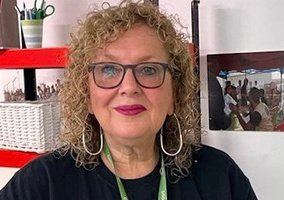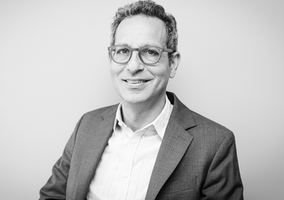For the past five years, Tum Kazunga has led Habitat for Humanity Great Britain, an international charity tackling poverty and homelessness. He has previously worked at fellow charities Action Against Hunger and FARM-Africa.
“I've always had an intense passion and interest in development and youth engagement. I volunteered quite a bit in Africa, in conservation.”
Kazunga is from Zambia, and after working there for a time in his twenties in the commercial sector, he moved to the UK and began to pursue a career in the voluntary sector.
“I’d say for anyone who’s grown up in Africa, you’re very much aware of issues of poverty and the associated issues that it can cause to people and families. So when I came back to the UK, I decided it’d be nice to transition away from the private sector, and I thought I’d enjoy working in the NGO space.
“But it was really difficult to break in. I had quite a few applications rejected.”
Kazunga spent around three months volunteering in the Children’s Society’s the corporate team. He said it was a “great experience, but of course on the flip side, I could only do that because my wife said, fantastically, she could support me”.
“On the back of that knowledge and experience, I was then able to demonstrate an understanding of the sector, and I could get a job.” Kazunga’s first job was at Sense, before moving onto international development roles.
The chief executive notes “you’re not earning a salary while you are volunteering” and that can be a barrier to entry to the sector, if that experience is expected.
“I’d like to think it's improved now,” says Kazunga, as 20 years ago “it was definitely very difficult to break into the sector unless you have that experience”.
“The sector has become much better at looking at ourselves and trying to understand some of these barriers that we place in the way of the best people, best talent, joining us.”
Nonetheless, he says: “I'm sure it is still quite difficult for certain people to break into the sector” and there is more to be done.
‘Recruitment is an ongoing challenge’
Kazunga says Habitat for Humanity has “been able to hire some incredible staff”, but like in many charities, “recruitment is an ongoing challenge”.
Currently, the charity has 11 full time and three part time staff.
“If I was going to have one takeaway as a leader, it is to take as much time as you can to find the best team possible, and then give them the best support you can, so they can do what it is that they’re good at.
“We’re focused on that, and the board has been incredibly supportive,” Kazunga says.
“Your unrestricted income is very limited,” so “when you're spending we're really making sure we can spend it in the best way possible”.
Something which has been a bit “disappointing” for Kazunga is that “we still struggle as a sector to demonstrate to the wider society, and our supporters, how important it is for us to have our costs covered, how important it is for us to be able to pay a good fair wage to our staff so that we can hire the best people, so we can have the best impact.”
He notes retention can also be “challenging” for charities, and Habitat for Humanity is adapting to having an almost fully remote office.
“We lost our office during the pandemic and we’ve decided not to absorb that cost at the moment. So we can hire staff around the country. We’ve got some amazing staff outside of London, which is great.
“But of course it is a challenge around how do you keep them engaged.”
Kazunga says as an organisation Habitat for Humanity have always been very committed to removing barriers to allow people to join, so being geographically diverse is welcome – “you want as much diversity of thought within the organisation as possible”.
“How can the sector make sure that it's easy for anyone to join who has a passion to make a change in the world? We have to make sure that we can continue challenging ourselves to do that.”
‘This is about transferring power’
The chief executive says on the international side a great change has been awareness of some of the issues within the sector, generally. Issues around the decolonisation of aid, for example, have been highlighted.
“The type of language, the inclusivity of language that we use, all of these things are really important if we're talking about attracting as much talent as possible and being relevant today, as well as being true to our mission and to the communities that we want to serve.
“The other change which has become really clear now is the importance for northern NGOs, to really consider the impact they have and how they can very deliberately build the agency and empower NGOs in the Global South, so they can really take ownership of their development agenda.”
Kazunga says this is a “point of passion”.
“It is about making sure we can really look at how we empower community groups in the Global South, and this is about transferring power, so making conscious choices as northern NGOs to do that.
“It’s not easy, of course, but it’s something that has to be done. That’s an area that I’d love to see the sector spend more time on, and it’s beginning.”
‘We’re a small cog in that larger wheel’
Kazunga says poverty reduction programming should be considered “holistically” because often, “you can have an intervention that works in a very narrow focus and might have an impact, but doesn't really make a difference in other parts of people's lives”.
Asked why he was drawn to Habitat for Humanity, he says: “Housing is a critical, fundamental need. So that attracted me, because it’s one of those areas where if you can make a difference, you can have a cascading impact on a life so that their future life chances are definitely enhanced.
“It’s very hard to see how a child, for example, could thrive in an educational system or even a health perspective, if they live in very poor housing.”
Kazunga describes housing as a global issue, and says that the charity has “been helped by the fact that it is such a hot topic”.
For example, in the UK every day there are articles about poor housing conditions that exist “whether it’s mould, whether it's issues around cladding, whether it's issues of accessibility, affordability – everyone is very much aware of that.”
Kazunga adds: “We have that advantage when I speak to potential partners, they get it. They don't need to be persuaded as to why it's important. Of course, then we might have a conversation as to why this particular intervention we're recommending is important, and the impact that will have.”
He says: “I like the breadth and reach of the organisation. It's a big family. We’re a small cog in that larger wheel. Habitat Great Britain isn’t a massive charity in our own right, but we're able to leverage the amazing talent that exists in the Habitat family across the world.
“We can definitely punch above our weight, which is great. But also you have the advantage of being a smaller charity and the sleekness of foot and being nimble that comes with that. In many ways, I guess the best of both worlds right?”.
‘The rug has been pulled out from under your feet’
Before the pandemic, the charity had spent a lot of time on its strategy, but “Covid blew all of that out of the water”.
“Very quickly, whatever strategies any of us developed, were pretty much null and void. And then it became a question, from our perspective at least, about survival. You’re a small charity all of a sudden, the rug has been pulled out from under your feet.
“You want to make sure that your sustainability can be ensured, but also at the same time, recognising that there's this massive need that’s occurring across the world and the demand for our services, our work had never been greater.
“We responded and our partners helped us respond very positively to that. But it was a really tough, tough time. Our income dropped tremendously.”
Charity Commission data for the year ending June 2021, puts Habitat’s income at £1.5m, compared to £2.6m the year prior.
“After Covid the goal was right, how do we recover? How do we ensure that we can continue to have this level of impact? How do I make sure as a leader, my team can also recover? They have spent a year working tremendously hard putting everything on the line, I was really worried about issues such as burnout.”
‘We’re looking to double our income now’
Going into the cost-of-living crisis, Kazunga is aware of the “need to be very conscious of the fact that we have incredibly generous supporters, but a lot of them will be suffering”.
“We need to be aware of that and we need to respect that, and we need to make sure that in our messaging that that comes across clearly.”
Kazunga says the charity has a “healthy mix of fundraising streams” mainly comprised of individual supporters, corporate partnerships, trusts and foundations and institutional donors.
From the height of 2021 “we’re probably looking to double our income now – which is great”.
“We’ve also been able to make investments in improving our capacity, around how we can grow our corporate fundraising support, but also trusts and foundations has been a big area of growth, as has high net worth individual giving,” he says.
“We’ve managed to build a very strong team who have led this growth.”
Related Articles












